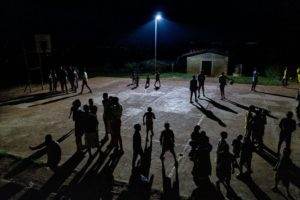Change happened over night when solar powered street lights were switched on in Nyabahike refugee camp. Women danced and cheered as the streets were lit up for the first time. The camp became a city for the children who chanted “Kigali, Kigali, Kigali”. Community lighting has transformed the everyday lives of refugees and has astounded camp managers and other NGOs working in the camp.
63 solar-powered street lights have been installed across Nyabiheke refugee camp. The lights have been erected along popular walkways, outside the health clinic and other community facilities and next to recreational grounds and market places.
The camp has become alive after nightfall. Children gather in the evenings to play, practice basketball and study together under the lights. Street sellers have sprung up selling fruits and vegetables in the early evening. Women feel able to leave their homes after dark to use the bathrooms and toilets. There is a common belief that the camp is a safer place and people no longer feel their movements are restricted after dark. Families and friends visit each other’s homes at night to enjoy evenings together and to celebrate festivals, vigils and weddings.
 The locations for the lights were identified by refugees. This has ensured that the most important areas for the community are now lit up. Vandalism has been an issue in the camp for previous infrastructure installations and the fear of damage remains very real. A team of refugee technicians has been established and trained to monitor and maintain the lights. The camp manager continues to advocate for their safekeeping: “These lights are ours, let’s protect them and do what we can to protect them. Look at it as if you protecting a child and protecting life”.
The locations for the lights were identified by refugees. This has ensured that the most important areas for the community are now lit up. Vandalism has been an issue in the camp for previous infrastructure installations and the fear of damage remains very real. A team of refugee technicians has been established and trained to monitor and maintain the lights. The camp manager continues to advocate for their safekeeping: “These lights are ours, let’s protect them and do what we can to protect them. Look at it as if you protecting a child and protecting life”.
Previously, the effect of energy solutions on the lives of people living and working in the camps was underestimated by some partners. Partners who managed the health clinic, washrooms and toilets recognised the benefit but others considered them as a luxury, and a distraction from the provision of basic needs. However, now they have witnessed community-wide change and are becoming advocates for energy solutions. “I never understood the badness of darkness until I saw the lights” exclaimed the Nyabiheke camp manager.
185 street lights have been installed across Nyabiheke, Kigeme and Gihembe refugee camp under the Renewable Energy for Refugees project. The positive experiences to date are attracting the attention of government officials and development and humanitarian agencies to learn from and repeat the experience across the country and in other displacement settings. This is a powerful example of how a single technology can transform communities and better the everyday lives of thousands of refugees.
Visit our Renewable Energy for Refugees Project page for more information.